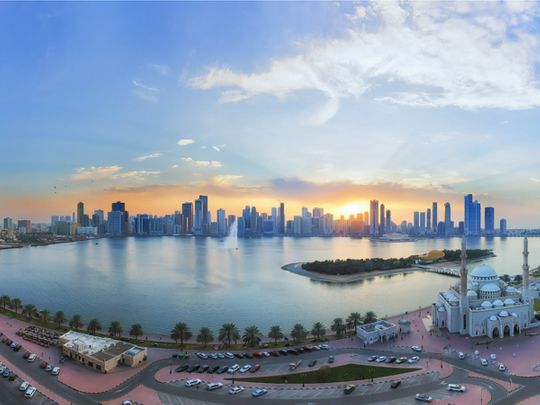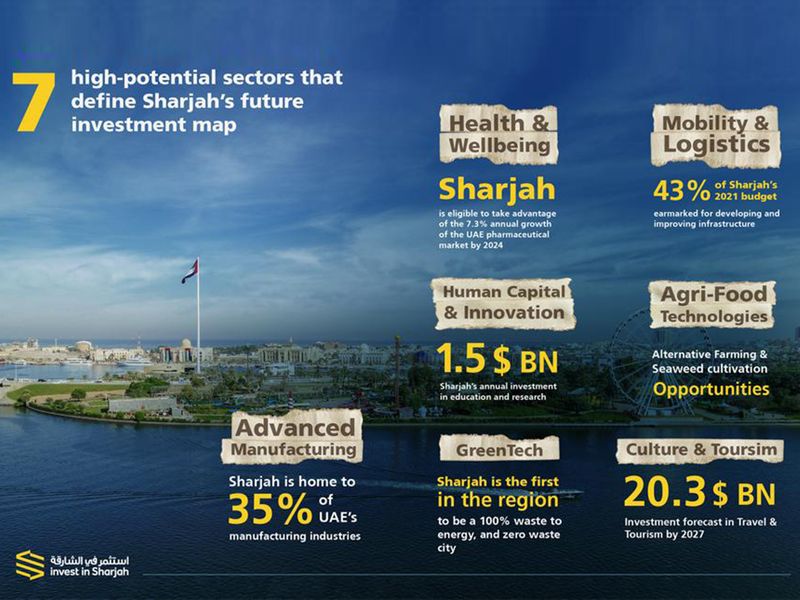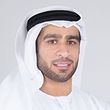
Dubai: For its medium-term economic growth, Sharjah will continue with the same strategy that served the emirate well during the Covid phase – attract more foreign investments. And into seven sectors likely to attract the highest degree of attention.
Take the healthcare sector, as a case in point – “Owing to a growing ageing demographic, an overall rise in population and medical advances, Sharjah’s health and wellbeing sector is primed to witness a boost in foreign investments,” according to a report by Sharjah FDI. “The UAE’s status as one of the Top 10 global healthcare destinations as per Medical Tourism Index, has an added positive impact.”
It ties in with the prevailing sentiment that more opportunities will open up in the UAE for super-specialty health support, both within hospitals and at-home for follow-up care.
Within this, three sub-sectors - pharmaceutical production; specialised healthcare institutes including elderly care and rehab centres; and wellness and medical tourism – could serve Sharjah’s future interests well. More so, as the emirate is a ‘preferred low-cost destination for medical tourism in the region’.
According to Ahmed Obaid Al Qaseer, Acting CEO of Sharjah Investment and Development Authority, “Sharjah is home to many investment opportunities in various fields, especially in New Economy sectors. With advanced infrastructure and agile legislation, the emirate has become a premier destination for businesses and a capital of industry in the region.

We look forward to welcoming new companies to Sharjah that will undoubtedly benefit from the accelerating growth and ongoing support of creative projects in the emirate and the UAE.

The UAE’s per capita health expenditure in 2019 was $1,643 (Dh6,035), and the growth projection for the pharmaceutical sector is 7.3 per cent annually to $ 4.7 billion (Dh17.26 billion) by 2024. “All this means that Sharjah’s potential to benefit from FDI in these sectors is massive,” the report notes.
Supply chain dynamics
“With a coastline each on the Arabian Gulf and Gulf of Oman, Sharjah has been a preferred gateway into the region for those looking for shorter access routes from the Far East and South Asia, Australia, and Africa,” states the Sharjah FDI report. “The emirate is ripe with FDI opportunities in the mobility and logistics sector. (The sector received a boost of 43 per cent in Sharjah’s 2021 budget for developing and improving its infrastructural facilities including roads.)
Heritage serves Sharjah well
Sharjah in these two years has let its landscape, heritage and future prospects as a destination do all the talking. Shurooq on its own and through alliances with key partners has been working to develop hitherto underserved locations across the emirate, and the initial results are there to see.
The emirate’s culture, media and tourism sectors is slated to reach $20.3 billion (Dh74.5 billion) by 2027, with the emirate ‘transforming as a destination of choice for global travellers with multi-billion dollar development projects as well as government support’. The projections also take into account the report’s findings on the number of hotel guests received by the emirate in 2019, which grew by 5 per cent year-on-year. (Revenues of $157 million (Dh573 million) was generated through hotel receipts in 2019, and the sector’s post-Covid recovery has been fast paced.)
The emirate’s ‘biodiversity and rich local heritage have created unique investment opportunities in ecotourism and adventure tourism,” the report finds. “Additionally, world-class business and cultural events organised in the emirate throughout the year are key factors in attracting tourists, which provides great investment opportunities.”
Mohamed Juma Al Musharrkh, CEO of Sharjah FDI Office, said: “Invest in Sharjah is keen on attracting and facilitating investments seeking growth in the emirate’s secure and stable environment. Leveraging the close relationship between our private and public sectors, we can facilitate investors’ access to incredible investment opportunities and provide all the support needed, starting from ideation to project launch.”
Now, beyond the obvious sectors, there’s potential in emerging ones. Agritech is one such.
“The eastern coast of Sharjah has a wealth of investment opportunities to establish aquaculture and seaweed farming facilities, in addition to aquaponics, vertical urban farming, and plant genomics,” the Sharjah FDI report adds. Any progress in drawing investments would be in sync with the possibilities offered by way of food processing and packaging, especially with the ‘availability of industrial zones across the emirate’.
The UAE’s agricultural produce market was estimated at $626 million (Dh2.3 billion) in 2019 with a 9.8 per cent CAGR of revenue. Sharjah is expected to be a major contributor to the $1.1 billion UAE agricultural market by 2024.
GreenTech
Sharjah’s potential in greentech-related investments is ‘one of the highest in the region’, given the progress it has made by being the first ‘zero landfill city’ of the Middle East. Then there is a solar park and waste-to-energy plant by Bee’ah that powers nearly 67,000 households.
Tap the schools
With annual investments of $1.5 billion (Dh5.5 billion) in education and research, the Invest in Sharjah FDI trend report highlights funding possibilities in specialised vocational academies and future upskilling and innovation labs. Not just that, “There are several investment opportunities emerging in early years learning and childcare specialties alongside the expansion of nurseries and K-12 offerings in Sharjah,” the report finds.
There’s manufacturing too
Sharjah, which is base to more than 35 per cent of the UAE’s manufacturing ventures, wants to ‘maximise efficiency gains’ through automation using advanced technologies, in addition to developing 3D printing capabilities for the manufacture of spare parts and components for industries. Such projects could potentially tap a growing GCC market estimated at $10.3 billion (Dh37.8 billion) by 2023.

In the post-COVID world, investments in technology are outpacing all other sectors. Sharjah’s unveiling of the first 3D printing house in the region signals its competitiveness in advanced manufacturing.
As the Sharjah FDI report notes, it won’t be the only sector in Sharjah’s that’s up there for optimum investments.
The emirate hosts six free zones and 33 industrial zones.
Sharjah attracted FDI worth $220 million in 2020.
There was a 60 per cent growth in FDI in Q3- and Q4- of 2020.
FDI helped with the creation of 1,117 new jobs in 2020.
Travel and tourism sectors investments to reach $20.3 billion by 2027.
Around $1.5 billion already invested annually in education and research in Sharjah.
Sharjah is home to more than 35 percent of the UAE’s manufacturing industries, which gives it an edge in manufacturing spare parts and components for industries.












